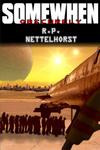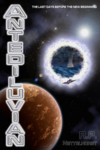A TED talk: Astronomer Dimitar Sasselov and his colleagues search for Earth-like planets that may, someday, help us answer centuries-old questions about the origin and existence of biological life elsewhere (and on Earth). How many such planets have they found already? Several hundreds.
Thursday, July 22, 2010
Quote for the Day
"Build a man a fire, and he'll be warm for a day. Set a man on fire, and he'll be warm for the rest of his life."
— Sir Terry Pratchett, author of the Discworld series of fantasy novels
— Sir Terry Pratchett, author of the Discworld series of fantasy novels
Friday, July 09, 2010
Another Quote for the Day
I have found that most people are about as happy as they make up their minds to be.
--Attributed to Abraham Lincoln in 1917 in How to Get What You Want, by Orison Marden
--Attributed to Abraham Lincoln in 1917 in How to Get What You Want, by Orison Marden
Quote for the Day
Space isn't remote at all. It's only an hour's drive away if your car could go straight upwards.
--Sir Fred Hoyle, British astronomer and science fiction author who coined the term "Big Bang." He never liked that theory.
--Sir Fred Hoyle, British astronomer and science fiction author who coined the term "Big Bang." He never liked that theory.
Thursday, July 08, 2010
Things Aren't as Bad as They Say
From the Huffington Post (by way of Instapundit), Down with Doom: How the World Keeps Defying the Predictions of Pessimists, by Matt Ridley:
Matt Ridley, the author of the article, has written a book, The Rational Optimist: How Prosperity Evolves.
When I was a student, in the 1970s, the world was coming to an end. The adults told me so. They said the population explosion was unstoppable, mass famine was imminent, a cancer epidemic caused by chemicals in the environment was beginning, the Sahara desert was advancing by a mile a year, the ice age was retuning, oil was running out, air pollution was choking us and nuclear winter would finish us off. There did not seem to be much point in planning for the future. I remember a fantasy I had - that I would make my way to the Hebrides, off the west coast of Scotland, and live off the land so I could survive these holocausts at least till the cancer got me.
I am not making this up. By the time I was 21 years old I realized that nobody had ever said anything optimistic to me - in a lecture, a television program or even a conversation in a bar - about the future of the planet and its people, at least not that I could recall. Doom was certain.
The next two decades were just as bad: acid rain was going to devastate forests, the loss of the ozone layer was going to fry us, gender-bending chemicals were going to decimate sperm counts, swine flu, bird flu and Ebola virus were going to wipe us all out. In 1992, the United Nations Earth Summit in Rio de Janeiro opened its agenda for the twenty-first century with the words `Humanity stands at a defining moment in history. We are confronted with a perpetuation of disparities between and within nations, a worsening of poverty, hunger, ill health and illiteracy, and the continuing deterioration of the ecosystems on which we depend for our well-being.'
By then I had begun to notice that this terrible future was not all that bad. In fact every single one of the dooms I had been threatened with had proved either false or exaggerated. The population explosion was slowing down, famine had largely been conquered (except in war-torn tyrannies), India was exporting food, cancer rates were falling not rising (adjusted for age), the Sahel was greening, the climate was warming, oil was abundant, air pollution was falling fast, nuclear disarmament was proceeding apace, forests were thriving, sperm counts had not fallen. And above all, prosperity and freedom were advancing at the expense of poverty and tyranny.
Matt Ridley, the author of the article, has written a book, The Rational Optimist: How Prosperity Evolves.
Wednesday, July 07, 2010
Quote for the Day
You can’t make people happy by law. If you said to a bunch of average people two hundred years ago “Would you be happy in a world where medical care is widely available, houses are clean, the world’s music and sights and foods can be brought into your home at small cost, travelling even 100 miles is easy, childbirth is generally not fatal to mother or child, you don’t have to die of dental abcesses and you don’t have to do what the squire tells you” they’d think you were talking about the New Jerusalem and say ‘yes’.
--Terry Pratchett, author of the Discworld series of fantasy books.
--Terry Pratchett, author of the Discworld series of fantasy books.
Tuesday, July 06, 2010
Quote for the Day
If Men are so wicked as we now see them with Religion what would they be if without it?
--Benjamin Franklin, letter to an unknown recipient, December 13, 1757
--Benjamin Franklin, letter to an unknown recipient, December 13, 1757
Monday, July 05, 2010
Quote for the Day
"The wise know their weakness too well to assume infallibility; and he who knows most, knows best how little he knows."
- Thomas Jefferson, The Proceedings of the Government of the United States, in maintaining The Public Right to the Beach of the Missisipi, Adjacent to New-Orleans, Against the Intrustion of Edward Livingston (1812)
- Thomas Jefferson, The Proceedings of the Government of the United States, in maintaining The Public Right to the Beach of the Missisipi, Adjacent to New-Orleans, Against the Intrustion of Edward Livingston (1812)
Saturday, July 03, 2010
Stem Cells From Blood
According to an article at ScienceNews.org, Stem cells from blood a 'huge' milestone by Laura Sanders:
Blood drawn with a simple needle stick can be coaxed into producing stem cells that may have the ability to form any type of tissue in the body, three independent papers report in the July 2 Cell Stem Cell. The new technique will allow scientists to tap a large, readily available source of personalized stem cells.
Because taking blood is safe, fast and efficient compared to current stem cell harvesting methods, some of which include biopsies and pretreatments with drugs, researchers hope that blood-derived stem cells could one day be used to study and treat diseases — though major safety hurdles remain.
The findings “represent a huge and important progression in the field,” stem cell biologist Shinya Yamanaka of Kyoto University in Japan and the Gladstone Institute of Cardiovascular Disease in San Francisco, Calif., writes in a commentary appearing in the same issue of the journal.
Friday, July 02, 2010
Quote for the Day
"What really is the point of trying to teach anything to anybody?"
This question seemed to provoke a murmur of sympathetic approval from up and down the table.
Richard continued, "What I mean is that if you really want to understand something, the best way is to try and explain it to someone else. That forces you to sort it out in your mind. And the more slow and dim-witted your pupil, the more you have to break things down into more and more simple ideas. And that's really the essence of programming. By the time you've sorted out a complicated idea into little steps that even a stupid machine can deal with, you've learned something about it yourself."
--Douglas Adams, Dirk Gently's Holistic Detective Agency (1987)
This question seemed to provoke a murmur of sympathetic approval from up and down the table.
Richard continued, "What I mean is that if you really want to understand something, the best way is to try and explain it to someone else. That forces you to sort it out in your mind. And the more slow and dim-witted your pupil, the more you have to break things down into more and more simple ideas. And that's really the essence of programming. By the time you've sorted out a complicated idea into little steps that even a stupid machine can deal with, you've learned something about it yourself."
--Douglas Adams, Dirk Gently's Holistic Detective Agency (1987)
Thursday, July 01, 2010
Quote for the Day
A sense of duty is useful in work, but offensive in personal relations. People wish to be liked, not be endured with patient resignation.
--Bertrand Russell
--Bertrand Russell
Using a Computer to Help Decipher Ancient Texts
By way of a misleadingly titled and not always entirely accurate article on the science fiction website, io9.com, Computer program deciphers a dead language that mystified linguists, I ran across a fascinating paper: A Statistical Model for Lost Language Decipherment by Benjamin Snyder and Regina Barzilay of CSAIL at the Massachusetts Institute of Technology and Kevin Knight of ISI at the University of Southern California:
If you're interested in Ugaritic and in computer translation and decipherment, check it out.
Dozens of lost languages have been deciphered
by humans in the last two centuries. In each
case, the decipherment has been considered a ma-
jor intellectual breakthrough, often the culmina-
tion of decades of scholarly efforts. Computers
have played no role in the decipherment any of
these languages.[sic] In fact, skeptics argue that com-
puters do not possess the “logic and intuition” re-
quired to unravel the mysteries of ancient scripts.
In this paper, we demonstrate that at least some of
this logic and intuition can be successfully mod-
eled, allowing computational tools to be used in
the decipherment process.
If you're interested in Ugaritic and in computer translation and decipherment, check it out.
Subscribe to:
Comments (Atom)




